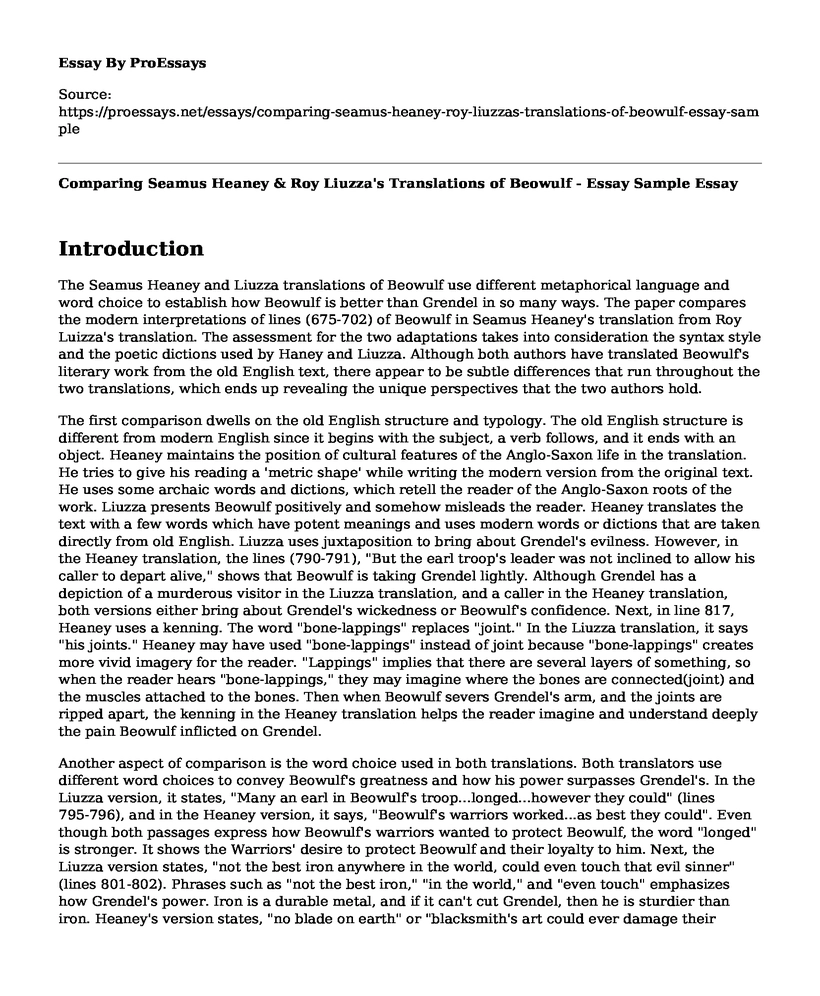Introduction
The Seamus Heaney and Liuzza translations of Beowulf use different metaphorical language and word choice to establish how Beowulf is better than Grendel in so many ways. The paper compares the modern interpretations of lines (675-702) of Beowulf in Seamus Heaney's translation from Roy Luizza's translation. The assessment for the two adaptations takes into consideration the syntax style and the poetic dictions used by Haney and Liuzza. Although both authors have translated Beowulf's literary work from the old English text, there appear to be subtle differences that run throughout the two translations, which ends up revealing the unique perspectives that the two authors hold.
The first comparison dwells on the old English structure and typology. The old English structure is different from modern English since it begins with the subject, a verb follows, and it ends with an object. Heaney maintains the position of cultural features of the Anglo-Saxon life in the translation. He tries to give his reading a 'metric shape' while writing the modern version from the original text. He uses some archaic words and dictions, which retell the reader of the Anglo-Saxon roots of the work. Liuzza presents Beowulf positively and somehow misleads the reader. Heaney translates the text with a few words which have potent meanings and uses modern words or dictions that are taken directly from old English. Liuzza uses juxtaposition to bring about Grendel's evilness. However, in the Heaney translation, the lines (790-791), "But the earl troop's leader was not inclined to allow his caller to depart alive," shows that Beowulf is taking Grendel lightly. Although Grendel has a depiction of a murderous visitor in the Liuzza translation, and a caller in the Heaney translation, both versions either bring about Grendel's wickedness or Beowulf's confidence. Next, in line 817, Heaney uses a kenning. The word "bone-lappings" replaces "joint." In the Liuzza translation, it says "his joints." Heaney may have used "bone-lappings" instead of joint because "bone-lappings" creates more vivid imagery for the reader. "Lappings" implies that there are several layers of something, so when the reader hears "bone-lappings," they may imagine where the bones are connected(joint) and the muscles attached to the bones. Then when Beowulf severs Grendel's arm, and the joints are ripped apart, the kenning in the Heaney translation helps the reader imagine and understand deeply the pain Beowulf inflicted on Grendel.
Another aspect of comparison is the word choice used in both translations. Both translators use different word choices to convey Beowulf's greatness and how his power surpasses Grendel's. In the Liuzza version, it states, "Many an earl in Beowulf's troop...longed...however they could" (lines 795-796), and in the Heaney version, it says, "Beowulf's warriors worked...as best they could". Even though both passages express how Beowulf's warriors wanted to protect Beowulf, the word "longed" is stronger. It shows the Warriors' desire to protect Beowulf and their loyalty to him. Next, the Liuzza version states, "not the best iron anywhere in the world, could even touch that evil sinner" (lines 801-802). Phrases such as "not the best iron," "in the world," and "even touch" emphasizes how Grendel's power. Iron is a durable metal, and if it can't cut Grendel, then he is sturdier than iron. Heaney's version states, "no blade on earth" or "blacksmith's art could ever damage their demon opponent" (lines 802-803). Compared to "blacksmith's art" or "on earth," "the world" seems broader and addresses everything in existence, which makes Grendel seem stronger in the Liuzza translation. Both passages emphasize Grendel's enormous power through different words. Finally, to tell the reader what crimes Grendel had committed, Liuzza states that he had "so much harm to the race of mankind, so many crimes" and that he was "marked by God" (lines 808-810). Again, in the Heaney version, Grendel "harrowed the hearts of men with pain and affliction." But in the Heaney version, it says, "and had given offense to God..." (lines 808-810). Even though both readings try to convey that Grendel is a terrible monster, the Heaney version puts more emphasis on that fact. It includes the phrase "had given offense to God" because an offense to God is an ultimate crime, and that shows that not only did Grendel torment humans, but he also offended God.
An additional glaring comparison between the two translations is in their writing styles. Heaney uses a modern approach that is enticing to a first-time reader but ends up stripping the lushness of the storyline. An example is in lines 3069-3075, where Heaney's writing flows smoothly with a clear meaning. However, Liuzza's translation is much completer in thought. It gives a more vivid description of the context. Also, the heightened sense of Christianity, as portrayed by Heaney, displays a certain level of accuracy in translation compared to Liuzza's work. Still, under the writing style, Liuzza uses more footnotes, which means that his topic is well researched and thorough as compared to Heaney's. Heaney's writing style is simple, while Liuzza's has done in-depth research.
Conclusion
In conclusion, both translations resemble each other tightly with minor disparities. The two authors use different figurative languages, writing styles, and word choices. Heaney's translation is more diverse in terms of the use of syntax and semantics. However, Liuzza's translation retains much of the original information.
Cite this page
Comparing Seamus Heaney & Roy Liuzza's Translations of Beowulf - Essay Sample. (2023, Mar 27). Retrieved from https://proessays.net/essays/comparing-seamus-heaney-roy-liuzzas-translations-of-beowulf-essay-sample
If you are the original author of this essay and no longer wish to have it published on the ProEssays website, please click below to request its removal:
- Essay on Comparing Two Translations of Heine's Poem
- Poetry Analysis Essay on One Art
- Essay Sample on Mythology Theory in Popular Culture
- Essay Sample on John Updike's Literary Skills
- Invictus by John Carlin Essay Example
- Literary Analysis Essay on Monstro by Diaz
- Biography of Charles Dodgson: Mathematician and Author of 'Alice's Adventures in Wonderland'







